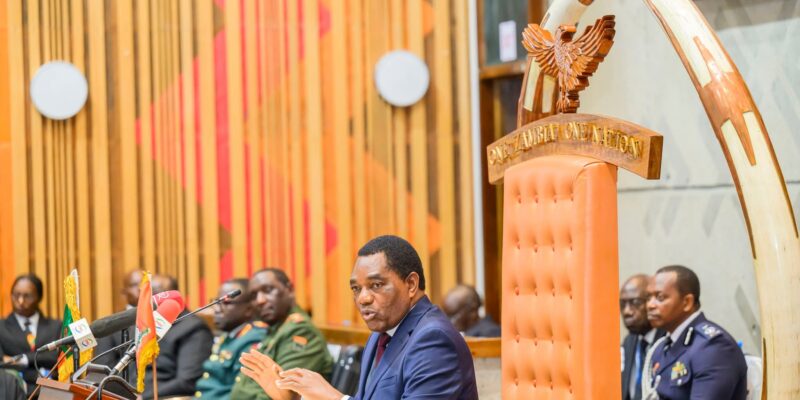Zambia's Diplomatic Battle: Washington vs. Beijing in a Geopolitical Showdown

Zambia finds itself at the epicenter of a significant geopolitical moment, attracting heightened attention from global powers including the United States, China, and Israel. This strategically important nation in Southern Africa is navigating a complex landscape where Washington pledges deeper economic cooperation, Beijing dispatches its Premier for a state visit focused on trade and infrastructure, and Israel's President has recently engaged on areas like agriculture and technology. This confluence of high-level diplomatic activity underscores Zambia's growing relevance as a key player in a quiet but intense contest for influence within the region.
The United States is actively expanding its economic footprint in Zambia, viewing the country as a stable anchor amidst regional volatility. Following a call between President Hakainde Hichilema and United States Secretary of State Marco Rubio, Washington expressed its intent to drive private sector investment and partner on reforms aimed at delivering tangible results. A cornerstone of US engagement is a substantial five-year health package valued at $1.5 billion, set to run from April 2026 to 2031. This package forms the backbone of a new multi-year agreement to be signed in December and targets critical areas such as human resources, laboratories, epidemic preparedness, and the control of HIV, TB, and malaria. Zambia's Health Minister, Elijah Muchima, highlighted the country's impressive achievements, including reaching the 98-98-97 HIV milestone and significantly increasing life expectancy. The American support seeks to consolidate these gains and transition Zambia towards full program ownership post-2030, though details remain under negotiation as Zambia seeks revisions on penalty clauses, stronger data protection measures, and tighter controls on long-term specimen sharing. A $323 million technical assistance component is also under review, with Zambia emphasizing the need to protect sensitive data and maintain oversight, a sentiment echoed by US Ambassador Michael Gonzales, who stated the package aims to build permanent systems rather than foster dependency.
Concurrently, China is reinforcing its long-term strategic ties with Zambia, with Premier Li Qiang arriving on November 19 for a two-day state visit. Foreign Affairs Minister Mulambo Haimbe indicated that discussions would span trade, investment, logistics, mining, agriculture, energy, and technology. A central focus of these talks is the revival and modernization of TAZARA, the historic railway China constructed in the 1970s, which Beijing now seeks to integrate into a broader industrial corridor. China remains Zambia’s most consistent infrastructural partner, with a significant presence across various sectors including mining, energy, construction, health, and manufacturing. The Premier’s visit signals China’s intention to maintain its strategic depth and leadership in infrastructure, critical minerals, and regional transport, particularly as Zambia draws increased attention from Western investors and multilateral banks.
Zambia has effectively become a crucial diplomatic corridor where global powers are vying for influence through soft power, strategic funding, and long-term positioning. While the United States sharpens its development and investment role, and China reinforces its industrial, mineral, and logistical leadership, Israel's recent visit adds dimensions of agriculture, security, and technology to this complex equation. Each relationship presents unique incentives, risks, and political weight for Lusaka. President Hichilema's administration faces the critical task of balancing these diverse interests, leveraging Chinese infrastructure, American capital, and Israeli technology while simultaneously safeguarding national sovereignty, ensuring transparent governance, and maintaining consistent policy. The coming weeks are pivotal in determining whether Zambia can effectively translate its heightened diplomatic visibility into sustainable investment, structural reform, and long-term economic durability.
You may also like...
When Sacred Calendars Align: What a Rare Religious Overlap Can Teach Us

As Lent, Ramadan, and the Lunar calendar converge in February 2026, this short piece explores religious tolerance, commu...
Arsenal Under Fire: Arteta Defiantly Rejects 'Bottlers' Label Amid Title Race Nerves!

Mikel Arteta vehemently denies accusations of Arsenal being "bottlers" following a stumble against Wolves, which handed ...
Sensational Transfer Buzz: Casemiro Linked with Messi or Ronaldo Reunion Post-Man Utd Exit!

The latest transfer window sees major shifts as Manchester United's Casemiro draws interest from Inter Miami and Al Nass...
WBD Deal Heats Up: Netflix Co-CEO Fights for Takeover Amid DOJ Approval Claims!

Netflix co-CEO Ted Sarandos is vigorously advocating for the company's $83 billion acquisition of Warner Bros. Discovery...
KPop Demon Hunters' Stars and Songwriters Celebrate Lunar New Year Success!

Brooks Brothers and Gold House celebrated Lunar New Year with a celebrity-filled dinner in Beverly Hills, featuring rema...
Life-Saving Breakthrough: New US-Backed HIV Injection to Reach Thousands in Zimbabwe

The United States is backing a new twice-yearly HIV prevention injection, lenacapavir (LEN), for 271,000 people in Zimba...
OpenAI's Moral Crossroads: Nearly Tipped Off Police About School Shooter Threat Months Ago
ChatGPT-maker OpenAI disclosed it had identified Jesse Van Rootselaar's account for violent activities last year, prior ...
MTN Nigeria's Market Soars: Stock Hits Record High Post $6.2B Deal

MTN Nigeria's shares surged to a record high following MTN Group's $6.2 billion acquisition of IHS Towers. This strategi...
:max_bytes(150000):strip_icc()/TAL-victoria-falls-zambia-KAZUNGULAQUAD0226-b6db7513304d43dfa92aa073c7f7b0b0.jpg)




